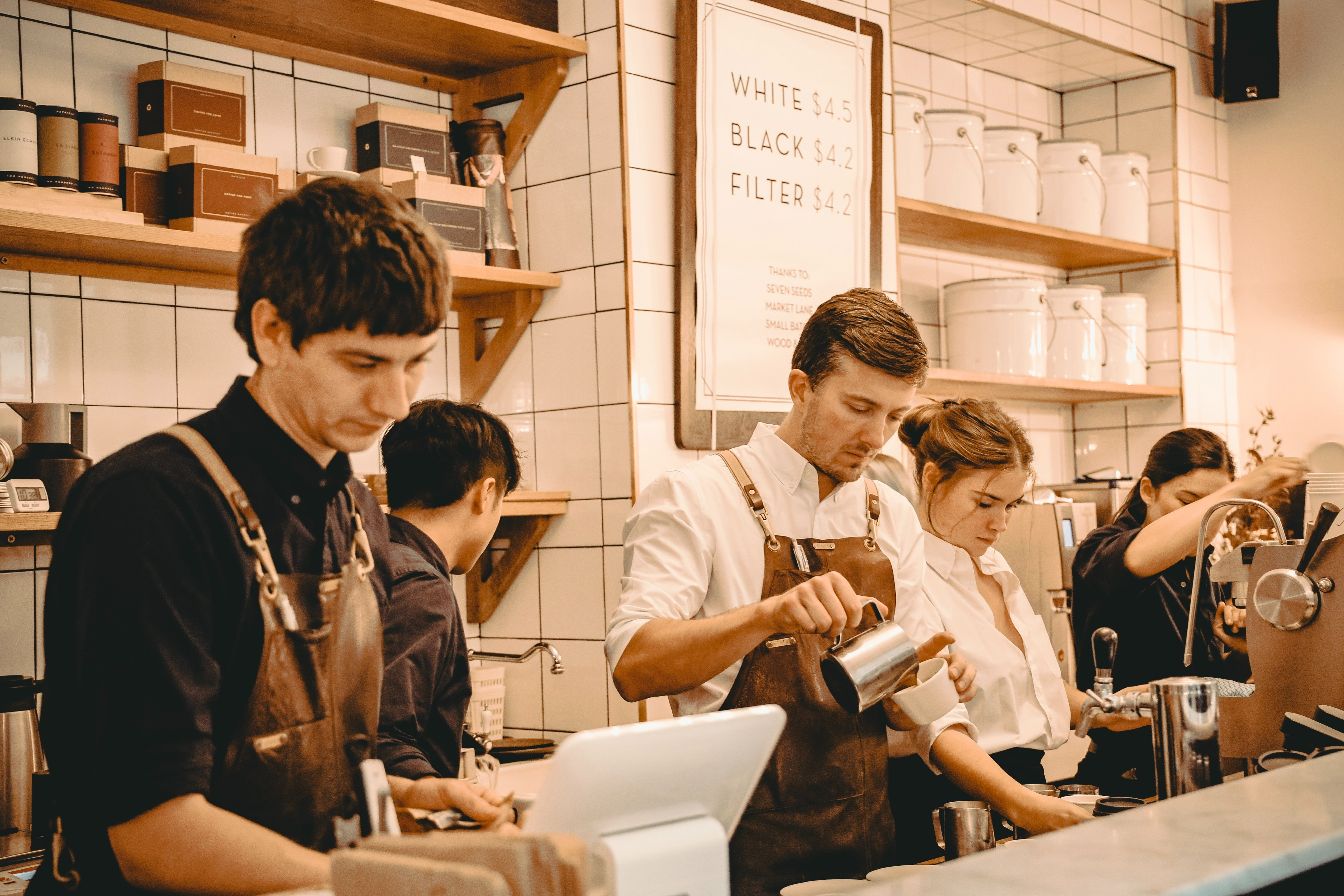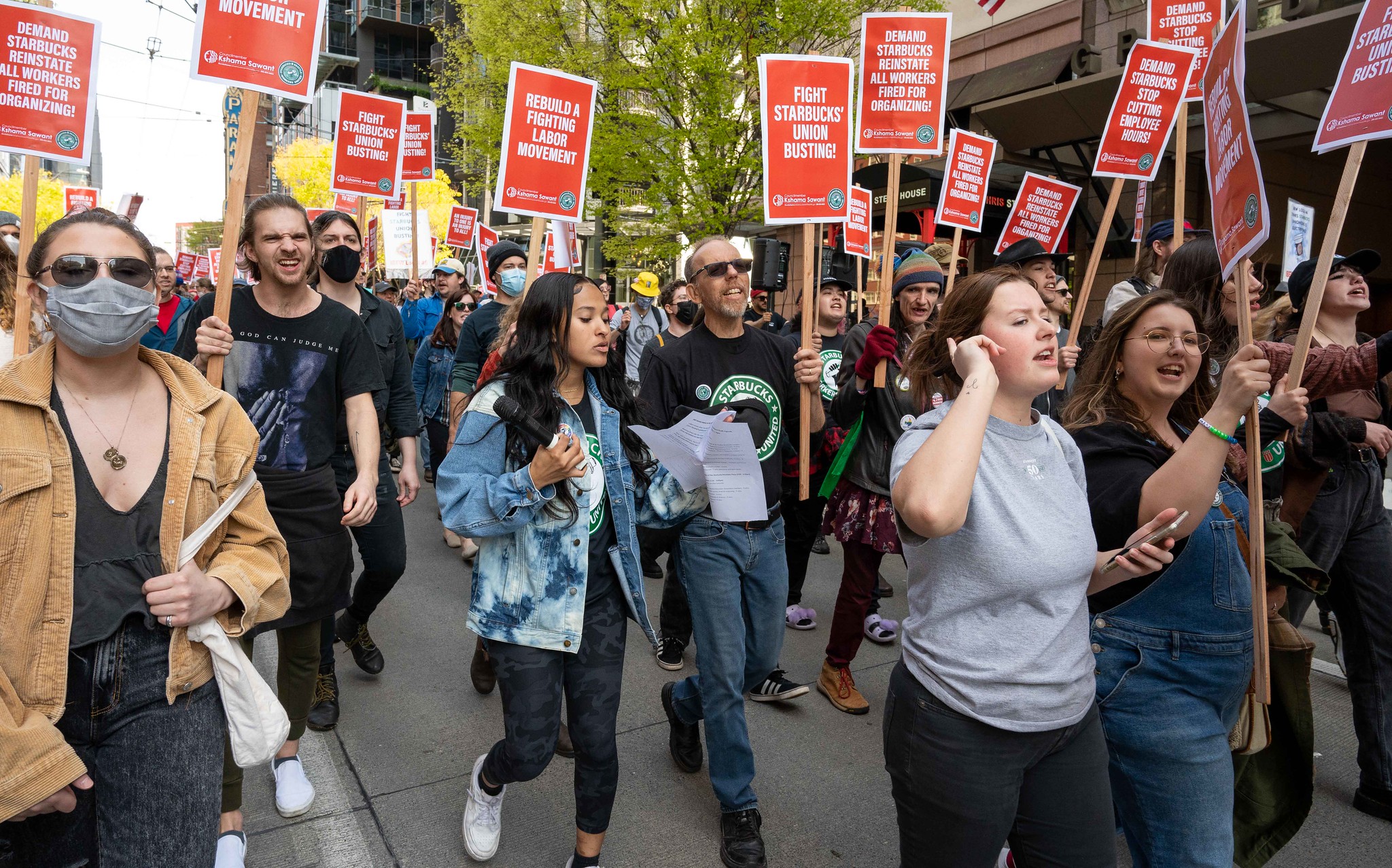Baristas of the world, unite
Inspired by the success of Starbucks United in the US, baristas in the UK are organising too - but fear corporate backlash is imminent.
Even by the standards of the notoriously low-paid hospitality industry, baristas do not fare well. With an average of £22,000 per year, they sit below pretty much every other related job in the UK. Chefs are paid over 18% more on average, waiters receive around £1,750 per year more.
In 2021, UK Hospitality and YouGov reported 30% of staff leave the sector every year, double the UK average. Simultaneously, many feel control over their work-life balance lives was slipping away: 55% of employees said this was a major factor of dissatisfaction within the industry, while 32% thought lack of transparency from employers didn’t help their long-term perceptions of hospitality as a viable career path.
The predominant issue, however, was poor pay: 63% saw it as the main factor that would need improvement, if staff were to consider staying in the industry.
Against this backdrop, Unite - the largest union representing hospitality workers in the UK - set up the Baristas United campaign in late 2022. The plan was to coalesce popular support and workplace organising around “demands for a real living wage, guaranteed hours and an end to chronic understaffing”.
The campaign began with awareness raising and scouting out potential organisers at different workplaces. “We’ve been speaking to hundreds of workers about their rights at work and how to enforce them”, Bryan Simpson, Unite’s National Organiser for Hospitality, says. “From this, we have identified scores of leaders who will help us take this campaign forward”
One such organiser is Hannah Cousins, a Costa employee, who says an early challenge was motivating workers to unite even after management raised wages - because the salary hike was, in real terms, a pay cut. “Costa Coffee gave us all a 50p wage increase in October,” she says. “Because this was a flat rate, for many of us, this hardly amounted to a 5% pay rise.” In fact, with recent RPI estimates at around 10%, this still results in the workers taking a 5% cut in real wages.
Nevertheless, Costa’s move dissuaded many colleagues from seeking further raises, says Cousins. She says she was“already hearing from colleagues that asking for a pay rise wouldn't be effective as we have just had one”.
But even if organising around material demands can prove challenging, there is a much broader demand hospitality workers can agree on: respect. “From individual conversations I've had, many baristas are fed up with the lack of respect they get at work - some saying they would never accept the way they are spoken to in everyday life,” Cousins says. “Rallying people around this, and highlighting how we all deserve respect and dignity at work no matter what our job seems to be cutting through.”
A Trans-Atlantic connection
The Baristas United campaign was directly inspired by the Starbucks Workers United campaign in the US, says Simpson, who used grassroots activism to unionise a sector left behind by many workers’ organisations. While organising on shop floors across the states, Starbucks Workers United eventually won unionisation votes at over 270 stores, uniting over 40,000 workers, a massive feat for a burgeoning union movement.
Baristas United has borrowed much of the basic framework, aims and mission statement from their US counterparts. “Starbucks United campaign showed we can unionise the sector and win big for the lowest paid and most precarious workers in the economy,” says Simpson.
The US campaign also offers insights into how aggressively corporations can push back when threatened. In Cheektowaga, New York, Starbucks workers had their store closed as soon as they attempted to unionise. In Arizona, a key organiser of the movement was fired the same day as Starbucks founder and interim-CEO Howard Schultz was claiming at a company town hall that the corporation was being “assaulted” by unionisation campaigns.
In March, during a fiery congressional hearing, Starbucks was accused by Senator Bernie Sanders of waging "the most aggressive and illegal union-busting campaign in the modern history of our country”.
It’s small surprise organisers like Cousins are bracing for British chains emulating Starbucks.
“Employers tend to pick individuals off and demoralise the rest of the organising workforce,” she says. “We know what's coming, but we are well prepared for it”.
Changing perceptions
Campaigners feel that organising is already having an effect. One of the largest coffee chains in the country, Pret a Manger, raised their pay for the third time in 12 months, amounting to a 19% pay rise year-on-year. Unite Hospitality, which works closely with Baristas United, were quick to claim credit, tweeting sarcastically they are “sure this has nothing to do with [their] Baristas United campaign aimed at driving-up pay and conditions across the chain”.
Pret, for their part, made no mention of organising efforts in their announcement, saying this was “another investment in [their] people”, aimed at making the chain a rewarding place to work.
Hospitality was once a sector where “workers often didn’t regard their jobs as worth organising”, says Cousins. “A lot of baristas are tired of their low wages and poor conditions but have never considered the prospect of organising and fighting for a better workplace”.
But In the last few months, Baristas United organised swathes of Zoom calls, pay surveys and interactive events with workers. If nothing else, the perception of barista being a job not worth fighting for is starting to change.
The Lead is now on Substack.
Become a Member, and get our most groundbreaking content first. Become a Founder, and join the newsroom’s internal conversation - meet the writers, the editors and more.





